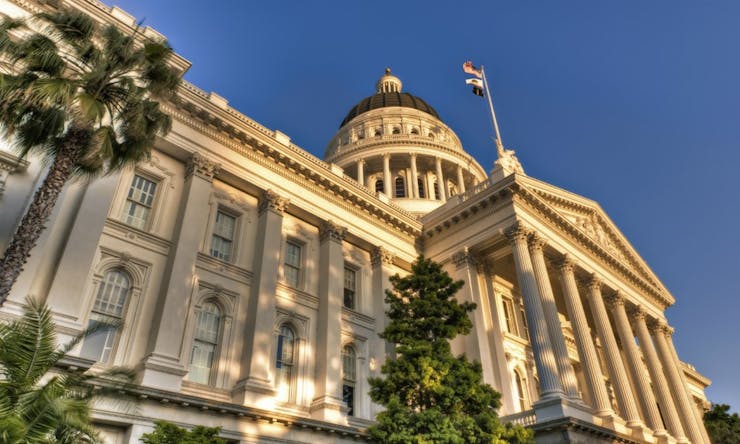Medical marijuana advocates are calling on California patients and caretakers to oppose a pair of bills in the Legislature that would raise costs by imposing taxes and fees on medical cannabis.
The bills are moving quickly through the Capitol and have garnered broad support from lawmakers. This week the Assembly and the Senate both passed separate measures, one of which would take effect immediately upon receiving the governor's signature.
The more substantial of the two bills, Senate Bill 987, introduced by Sen. Mike McGuire (D-Healdsburg), would charge patients a 15 percent “user fee” on cannabis purchases. It's essentially an excise tax, and it was called such in the initial version of the bill, but lawmakers amended the language to refer the tax as a fee in an effort to dodge a state requirement that tax increases earn a two-thirds majority vote from lawmakers.
The shift in jargon ultimately proved unnecessary. The full Senate passed McGuire's bill on Wednesday with a supermajority vote, 27–10–3, indicating a broad base of support for the added tax. SB 987 now goes to the Assembly for consideration.
Advocacy group Americans for Safe Access has come out sharply against the bill. “We do not assess ‘user fees’ on insulin, heart medications, or chemotherapy,” the organization said in an email to supporters.
“Imposing additional tax will be bad for public safety,” ASA’s California Director Don Duncan said. “Inflating the cost of legal medical cannabis will force some patients to buy less expensive cannabis from the unregulated illicit market — where there are no safety standards or oversight. That is the opposite of what regulations are supposed to accomplish.”
Meanwhile, the Assembly passed its own separate MMJ taxation measure on Thursday. Assembly Bill 2243 would tax the distribution of cannabis flowers at $9.25 per ounce, leaves at $2.75 per ounce, and immature plants at $1.25 each. Prior to passage, lawmakers amended the bill, introduced by Assemblymember Jim Wood (D-Healdsburg), to include a so-called urgency clause, meaning the tax would take effect immediately upon passage.
California medical marijuana transactions already incur ordinary sales tax, which is between 7.5 percent and 10 percent, depending on the jurisdiction. Cities and counties can levy additional taxes, and some jurisdictions charge up to 15 percent on top of state rates, according to Americans for Safe Access.
The group sent out an action alert last weekend asking residents to contact their senators and oppose the bill. The group pointed out that even The Tax Foundation, a third-party tax policy research organization, found that high taxes on medical cannabis create an incentive for patients to turn to the black market.
Other cannabis advocacy groups, including the Marijuna Policy Project, have also come out against the bills and are encouraging residents to contact their legislators.
While the proposed changes would mean higher costs for patients, not all in the medical marijuana community oppose it. When the bill was introduced in February, Eddie Miller, chief strategy officer at GreenRush.com, told the San Francisco Chronicle that he found the proposed tax scheme “excessive” but understandable.
California last year passed an ambitious package of statewide regulations to bring order to the state’s medical marijuana industry, which has been largely unregulated since voters first approved the use of medical cannabis in 1996. The new regulatory scheme, set to take effect in 2018, establishes an elaborate licensing system and sets up an oversight body — all of which will cost the state money.
“We made a commitment last year as we were working through the huge undertaking of setting statewide regulations for medical marijuana that we would follow up on a statewide excise tax,” Sen. McGuire said when he introduced SB 987.
“These are the steps necessary to have a quality industry and a safe industry for the consumer,” Greenrush.com’s Miller told the Chronicle. “It really provides a budget for the state to make it a legitimate industry like alcohol, tobacco, or even gambling.”
But alcohol, tobacco, and gambling are recreational pursuits — not medical ones. And states that allow both medical and adult-use cannabis tend to reflect that distinction.
In Oregon, for example, the state adds a 25-percent tax to recreational purchases. Purchases of medical cannabis by patients and caregivers, however, are tax free. In Colorado, both medical and retail sales are subject to the state’s 2.9-percent sales tax, but retail cannabis incurs an additional 10-percent state marijuana tax.
“Legitimate medicine should be taxed differently than a vice, such as alcohol, tobacco, or cannabis used for non-medical purposes,” Americans for Safe Access says on its SB 987 factsheet.
Some California officials continue to frame the proposal in prohibitionist terms, however, arguing that higher taxes are justified in order to make up for problems they blame on the gray-market system, such as environmental degradation and pesticide use. It’s worth pointing out that for the first 20 years medical cannabis was permitted California, state lawmakers failed to provide clear guidelines for cultivation practices or product testing. For decades it was unclear whether third-party testing labs were even allowed under state law, and operators risked shutdowns or worse.
George Runner, a former Republican state senator who now serves as vice chair of the Board of Equalization, coauthored AB 2243 and has urged the Legislature to pass a tax. “I’m the first to admit that government is too bloated and that Californians are overtaxed,” he said in a statement last year. “But the fundamental question here is who should pay the steep costs of marijuana-related activities that include trespass on public lands, water theft, and unregulated use of pesticides.”
The answer to that fundamental question, according to SB 987 and AB 2257 supporters? Patients, apparently.










